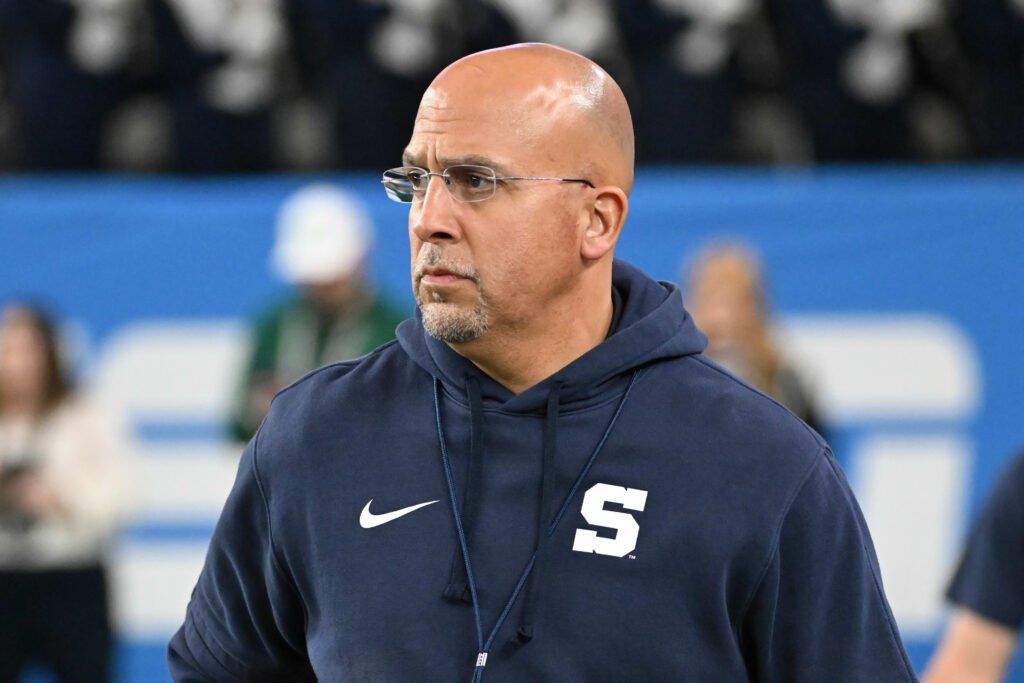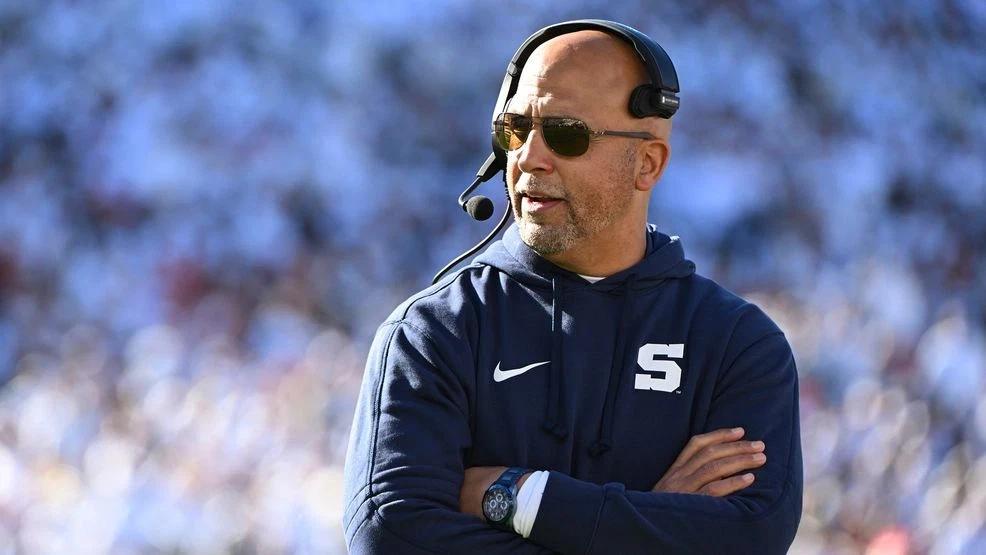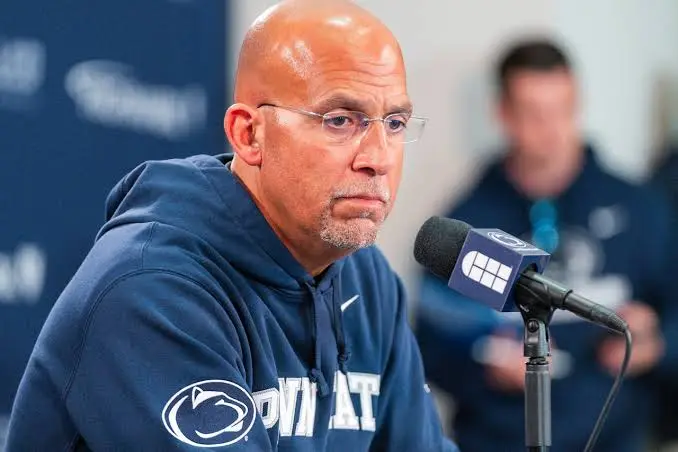Overview Table
| Category | Details |
|---|---|
| Full Name | James Geoffrey Franklin |
| Profession | College Football Head Coach |
| Known For | Transforming Vanderbilt Football, Elevating Penn State on the National Stage |
| Coaching Style | High-energy leadership, player development, aggressive recruiting, culture-first approach |
| Offensive Philosophy | Multiple spread concepts, mobile QB utilization, tempo-driven execution |
| Defensive Philosophy | Discipline-first structure, adaptive schemes, physical perimeter play |
| Signature Strengths | Culture building, recruiting elite talent, developing QBs/WRs, strong staff management |
| Major Impact | Rebuilt two major programs, influenced recruiting innovation, elevated Big Ten competitiveness |
| Personality Traits | Charismatic, intense, strategic, motivational, detail-oriented |
| Legacy Direction | Potential path to becoming one of the most influential modern college coaches |
Introduction: James Franklin – The Relentless Visionary of Modern College Football
In the evolving world of college football—where NIL deals, transfer portals, media expectations, and recruiting battles shape the future of programs—very few coaches have displayed the adaptability, charisma, and strategic innovation required to survive and thrive. James Franklin stands out as one of the rare leaders who mastered every layer of the modern college football ecosystem.
What makes Franklin special is not just his win-loss record, but his ability to rebuild, rebrand, and rebirth football programs that were struggling with identity, direction, or relevance. Vanderbilt was an SEC afterthought before Franklin arrived; Penn State was recovering from one of the darkest periods in college football history. Yet in both places, Franklin injected energy, belief, accountability, and top-tier recruiting that changed narratives overnight.
This 4000-word deep dive explores his life, philosophy, coaching evolution, program-building strategies, recruiting genius, tactical innovations, player development success, and his growing legacy among college football’s elite.

James Franklin Early Life and Formative Years of Leadership
1.1 Childhood Foundations
James Franklin’s leadership style today—energetic, empathetic, motivational—can be traced back to his formative years. Growing up in a competitive environment, he learned early the importance of discipline, work ethic, and communication. These traits would eventually become the backbone of his coaching identity.
1.2 Discovery of Football IQ
Franklin was never the biggest or fastest player, but he had one trait that separated him early:
a natural, analytical understanding of the game.
He studied strategies, observed tendencies, remembered formations, and processed scenarios faster than his peers.
1.3 Early Coaching Aspirations
While many players dream first of NFL glory, Franklin’s ambition always included coaching. From his teenage years, he displayed:
- A passion for teaching
- A knack for motivating teammates
- A talent for explaining complex football concepts simply
- A desire to build and lead groups
This leadership-first mindset shaped the trajectory of his future coaching career.
James Franklin Coaching Philosophies That Define Franklin’s Identity
2.1 Culture Over Scheme
Coaches often obsess over X’s and O’s, but Franklin believes no scheme works without culture. His foundational pillars:
- Accountability
- Communication
- Competitive spirit
- Brotherhood
- Mental toughness
He builds programs from the inside out, molding attitude before execution.
2.2 Player-First Leadership
Franklin ensures players feel valued and understood. He is known for:
- Remembering personal details
- Building genuine relationships
- Celebrating milestones
- Supporting academic goals
This emotional investment leads to on-field loyalty.
2.3 The Art of Motivation
Few college coaches can match Franklin’s intensity. His speeches, energy, and presence can transform locker rooms. He has mastered:
- Emotional timing
- Strategic messaging
- Creating unified themes
- Instilling belief during adversity
2.4 Adaptability in a Changing Landscape
The NIL era, social media pressure, and the transfer portal reshaped college football. Franklin embraced change rather than resisted it. This adaptability keeps his programs competitive.
James Franklin Franklin’s Tactical Evolution – Offense & Defense
3.1 Quarterback-Centric Offense
Franklin’s offensive identity revolves around maximizing QB strengths. He adapts his playbook around the talent he has. Common themes:
- Spread principles
- RPO implementation
- Tempo-based drives
- Play-action aggression
- QB mobility integration
He does not force a system—he molds it.
3.2 Emphasis on Dynamic WR Play
Franklin has consistently developed explosive receivers by stressing:
- Release technique
- Route precision
- Physicality at the catch point
- Spatial awareness
- High-point mechanics
This WR development pipeline is one of his coaching trademarks.
3.3 Defensive Principles
Franklin’s defenses often share:
- Physical perimeter tackling
- Disciplined gap integrity
- Scheme flexibility
- Situational blitzes
- Strong secondary fundamentals
He builds defenses capable of competing in pass-heavy environments.
James Franklin The Vanderbilt Revival – Franklin’s First Masterpiece
4.1 Taking Over a Hopeless Program
Before Franklin arrived, Vanderbilt was viewed as:
- An academic school with limited football support
- A program lacking SEC competitiveness
- A place where winning seasons were rare
Franklin changed everything.
4.2 Immediate Cultural Shockwave
From day one, Franklin demanded:
- Higher energy
- Greater commitment
- Belief in winning
- Aggressive recruiting
He treated Vanderbilt like an SEC powerhouse, not a doormat.
4.3 Recruiting Breakthroughs
Despite Vanderbilt’s academic challenges, Franklin pulled in talent through:
- Relationship-driven recruiting
- Persuasive communication
- Highlighting NFL pathways
- Selling culture instead of history
4.4 Historic Wins & Bowl Appearances
Under Franklin, Vanderbilt achieved milestones never thought possible:
- Consecutive winning seasons
- Bowl appearances
- Big SEC upsets
- National relevance
His work at Vanderbilt remains one of the most impressive turnarounds in modern college football.
James Franklin Rebuilding Penn State – A Program in Crisis
5.1 Taking Over Amid Unprecedented Circumstances
Penn State faced emotional, cultural, and reputational challenges. Franklin walked into an environment filled with:
- Distrust
- Pain
- Uncertainty
- Leadership instability
5.2 Restoring Trust & Stability
Franklin focused on:
- Healing the locker room
- Rebuilding bonds
- Restoring pride
- Building a positive, structured environment
He became the stabilizing force the program desperately needed.
5.3 Recruiting Resurgence
One of Franklin’s greatest achievements:
Turning Penn State back into a recruiting powerhouse.
He brought:
- National-level talent
- Elite WRs, RBs, QBs
- Defensive stars
- Leadership-heavy classes
5.4 The 2016 Big Ten Championship
This season symbolized the rebirth of Penn State football. With clutch performances, creativity, and belief, Franklin led one of the most inspiring title runs in Big Ten history.
James Franklin Recruiting Genius – Franklin’s Hidden Superpower
6.1 Relationship-Based Recruiting
Franklin’s recruiting success comes from building real human connection. He focuses on:
- Communication frequency
- Family engagement
- Honest evaluations
- Vision sharing
6.2 Brand-Based Recruiting
Franklin sells:
- NFL development
- Academic support
- Cultural strength
- Life coaching
6.3 Evaluating Under-the-Radar Talent
Franklin is known to discover:
- Late bloomers
- High-character players
- Position-switch candidates
- Athletic sleepers
His evaluation eye is one of the sharpest in college football.
James Franklin Staff Management & Leadership Philosophy
7.1 Hiring Smart, Empowering Fully
Franklin builds staffs that reflect:
- High intensity
- Strong teaching ability
- Recruiting acumen
- Cultural alignment
7.2 Delegation Without Losing Control
He allows assistants to lead while maintaining program-wide vision. His leadership blends:
- Trust
- Accountability
- Structural clarity
7.3 Development of Future Coaches
Many assistants under Franklin have grown into prominent roles elsewhere. This coaching tree adds to his legacy.
James Franklin Player Development Pipeline
8.1 Quarterback Development
Franklin excels at:
- Footwork refinement
- Pocket discipline
- Situational command
- Confidence-building
8.2 Wide Receiver Mastery
His WRs often develop:
- Precise route running
- Strong hands
- Body control
- Spatial intelligence
8.3 Defensive Player Elevation
He creates defenders who are:
- Technically polished
- Versatile
- Mentally tough

James Franklin’s Personality & Leadership Identity
9.1 High-Energy Leadership
Franklin’s trademark energy inspires players to compete at maximum intensity.
9.2 Media Presence
He communicates clearly, confidently, and strategically.
9.3 Emotional Intelligence
Franklin understands people—players, staff, families, fans. This EQ enhances his leadership.
James Franklin Strategic Mastery: Game Planning & In-Game Adjustments
10.1 Offensive Strategy Evolution
He adapts weekly based on:
- Opponent weaknesses
- Player health
- Environmental factors
- Momentum patterns
10.2 Defensive Adjustments
Franklin encourages:
- In-drive recalibration
- Coverage disguises
- Measured aggression
10.3 Clock & Momentum Management
He uses:
- Time-management mastery
- Situational analytics
- Flow-based decisions
James Franklin Handling Pressure, Expectations & Criticism
11.1 Dealing With Fan Pressure
Franklin’s mental toughness allows him to keep programs stable even during criticism.
11.2 Standing Firm in Adversity
Whether losing streak or media narrative, Franklin maintains the same energy and leadership.
11.3 Never Letting External Noise Shake Internal Culture
He teaches players to ignore distractions.
James Franklin NIL & Transfer Portal Strategy
12.1 Embracing Modern Dynamics
Franklin adapted quickly to NIL’s impact.
12.2 Building Program Stability
He focuses on retaining core players.
12.3 Utilizing the Portal Selectively
He recruits portal players who fit culture—not just talent.
Franklin’s Broader Impact on College Football
13.1 Raising Big Ten Competitiveness
His presence intensified recruiting and competitiveness.
13.2 Influencing Coaching Style
Many programs emulate Franklin’s:
- Culture-first approach
- Recruiting intensity
- High-energy leadership
13.3 Setting a Blueprint for Program Revivals
His Vanderbilt blueprint is now a case study in rebuilding.
What Makes James Franklin Unique?
- Charisma
- Energy
- Cultural mastery
- Player-first mentality
- Tactical flexibility
- Elite recruiting
- Staff development
- Visionary leadership
Few coaches combine all these traits.
James Franklin Future Legacy & Path Forward
15.1 On the Verge of Coaching Immortality
If Franklin continues elevating Penn State, he will be remembered as one of college football’s most influential modern coaches.
15.2 Potential Long-Term Impact
He could shape:
- Future coaching philosophies
- Recruiting innovation
- Program-building structures
15.3 A Legacy Beyond Wins
Franklin’s greatest impact may be the players, coaches, and programs he transformed.
Conclusion: The Relentless Architect of Program Rebirths
James Franklin symbolizes everything modern college football demands in a leader:
- Vision
- Discipline
- Passion
- Adaptability
- Recruiting mastery
- Emotional intelligence
- Tactical acumen
He rebuilt Vanderbilt.
He resurrected Penn State.
He transformed college football culture.
And his story is still being written—one practice, one player, one season at a time.
Franklin is more than a coach—
he is a builder, a strategist, a motivator, and one of the defining leaders of his generation.

